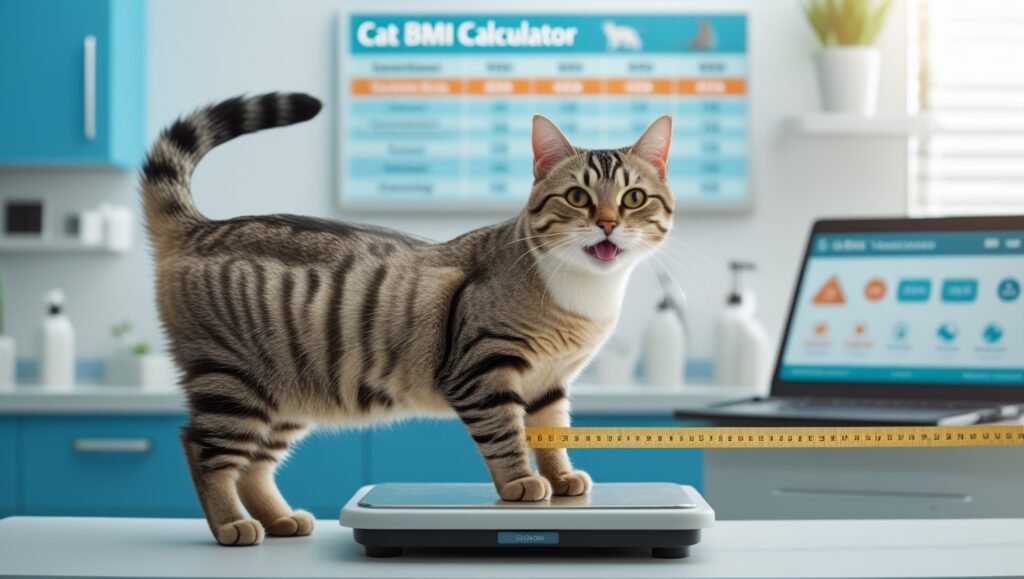Cat BMI Calculator
Your Cat’s BMI Result
BMI: 0
Advice
More Related Tools: Cat Benadryl Dose Tool – Accurate & Vet-Checked, Cat Benadryl Dose Tool – Accurate & Vet-Checked, Cat Age Calculator – Convert Cat Years to Human Years Easily
How to Use the Cat BMI Calculator: A Guide for Pet Owners
Introduction to Cat BMI
Monitoring your cat’s weight is essential for their overall health and longevity. Our Cat BMI Calculator helps you determine if your feline friend is underweight, at a healthy weight, or overweight. Body Mass Index (BMI) for cats provides a more accurate assessment than weight alone by considering both body mass and length.
Step-by-Step Guide to Using the Calculator
1. Measure Your Cat’s Weight
- Use a digital pet scale for accuracy
- If you don’t have one, weigh yourself holding your cat, then subtract your own weight
- Enter the weight in either kilograms (kg) or pounds (lbs)
- Select the appropriate unit using the kg/lbs toggle button
2. Measure Your Cat’s Length
- Have your cat stand naturally
- Measure from the tip of their nose to the base of their tail (not including the tail itself)
- Keep your cat as straight as possible without stretching
- Enter the length in centimeters (cm) or inches (in)
- Select the correct unit with the cm/in toggle
3. Calculate and Interpret Results
- Click the “Calculate BMI” button
- View your cat’s BMI score and health classification
- Read the personalized advice based on the result
Understanding Your Cat’s BMI Results
Underweight (BMI < 15)
- Possible causes: Illness, parasites, poor nutrition
- Recommended action: Veterinary consultation to rule out health issues
- Dietary adjustments may be needed to help healthy weight gain
Healthy Weight (BMI 15-30)
- Ideal range for most domestic cats
- Continue current diet and exercise routine
- Maintain regular veterinary check-ups
Overweight (BMI > 30)
- Health risks: Diabetes, joint problems, reduced lifespan
- Recommended action: Veterinary-supervised weight loss plan
- May require dietary changes and increased activity
Tips for Accurate Measurements
- Measure at the same time of day for consistency
- Use a non-slip surface for length measurements
- For anxious cats, try measuring during nap time
- Take multiple measurements and use the average
Maintaining Your Cat’s Healthy Weight
- Follow portion control guidelines for your cat’s age and size
- Incorporate interactive play sessions daily
- Choose high-quality, species-appropriate food
- Monitor weight changes monthly
- Schedule annual veterinary wellness exams

Frequently Asked Questions
Q: How often should I check my cat’s BMI?
A: We recommend checking every 3 months unless your vet suggests more frequent monitoring.
Q: Is BMI different for different cat breeds?
A: While the same BMI ranges apply to all cats, some large breeds may naturally fall at the higher end of normal.
Q: My cat won’t stay still for measurement. What should I do?
A: Try measuring while your cat is relaxed or sleeping. You can also mark their position on a blanket and measure afterward.
Q: Can kittens use this calculator?
A: This calculator is designed for adult cats (1 year and older). Kittens have different growth requirements.
By using our Cat BMI Calculator regularly, you can stay informed about your cat’s health status and make adjustments to their care as needed. Remember that while this tool provides helpful guidance, it doesn’t replace professional veterinary advice. Always consult your vet about significant weight changes or health concerns.